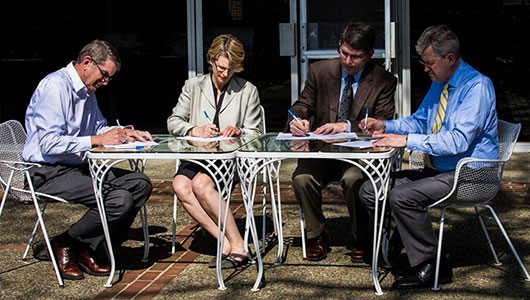
Left to right: David Smallen, vice president for libraries and information technology, Hamilton College; Wendy Raymond, vice president for academic affairs and dean of faculty, Davidson College; Douglas Hicks, provost and dean of the faculty, Colgate University; Andrew Shennan, provost and dean of the college, Wellesley College (credit: Wellesley College)
Colgate University and three peer liberal arts institutions joined together today in a new consortium focused on online teaching and learning.
The agreement between Colgate, Davidson College, Hamilton College, and Wellesley College is aimed at strengthening collaboration around online technologies, including the edX platform, where Colgate is now hosting its first fully open online learning experience: Greeks at War.
“By sharing what we have learned on our respective campuses, we can all improve the learning experience for our students while helping our faculty minimize false starts and maximize successes,” said Douglas Johnson, psychology professor and director of Colgate’s Center for Learning, Teaching, and Research.
The new agreement creates the framework for sharing member institutions’ faculty and staff expertise, library resources, analytics, computing and networking facilities, and collaboration in the creation and production of online course content.
“One of the keys here is sharing best practices and resources for instructional design and course development team structure,” said Kevin Lynch, Colgate’s chief information officer. “Liberal arts institutions often bring a fundamentally different approach to teaching and learning. What makes this consortium so valuable is that many of the existing online platforms don’t necessarily reflect this approach.”
Colgate is constantly examining ways to create dynamic educational opportunities through technology. In 2014, the university hosted Innovation and Disruption, a special symposium designed to examine the impact of technological developments in higher education. Recent examples of classroom innovation include Professor Karen Harpp’s Atomic Bomb course, and Living Writers, both of which welcome and encourage alumni participation.
Douglas A. Hicks, Colgate’s provost and dean of the faculty, said, “Liberal arts schools are centrally about teaching, learning, and the generation of new knowledge. In the spirit of this constant search for knowledge, we are launching this significant experiment in teaching and learning for our digital age. Sharing insights between colleagues in this consortium will create innovative learning opportunities.”
